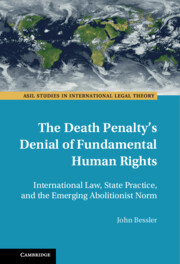 The Death Penalty's Denial of Fundamental Human Rights
The Death Penalty's Denial of Fundamental Human Rights Book contents
- The Death Penalty’s Denial of Fundamental Human Rights
- ASIL Studies in International Legal Theory
- Frontispiece
- The Death Penalty’s Denial of Fundamental Human Rights
- Copyright page
- Dedication
- Epigraph
- Contents
- Preface
- Acknowledgments
- Introduction
- 1 The Death Penalty
- 2 The Abolitionist Movement
- 3 Death Threats and the Law of Torture
- 4 Human Dignity and the Law’s Evolution
- Conclusion
- Bibliography
- Index
3 - Death Threats and the Law of Torture
The Death Penalty’s Inherently Cruel and Torturous Characteristics
Published online by Cambridge University Press: 01 December 2022
- The Death Penalty’s Denial of Fundamental Human Rights
- ASIL Studies in International Legal Theory
- Frontispiece
- The Death Penalty’s Denial of Fundamental Human Rights
- Copyright page
- Dedication
- Epigraph
- Contents
- Preface
- Acknowledgments
- Introduction
- 1 The Death Penalty
- 2 The Abolitionist Movement
- 3 Death Threats and the Law of Torture
- 4 Human Dignity and the Law’s Evolution
- Conclusion
- Bibliography
- Index
Summary
This chapter describes the immutable characteristics of capital punishment, which kills people and uses death threats by state actors. Death threats are ordinarily treated as unlawful acts, with threats of impending death treated as psychological torture where a person is helpless to prevent death. The chapter discusses how mock executions and various corporal punishments are already treated as torturous acts, including by laws and legal commentators. After discussing the duty of government officials to protect people, including inmates, from harm, as well as how jurists in multiple jurisdictions have recognized the death row phenomenon (i.e., the suffering associated with prolonged stays on death row), the chapter describes how countries have refused to extradite individuals without assurances that the death penalty will not be sought. The U.N. Convention Against Torture and Other Cruel, Inhuman or Degrading Treatment or Punishment contains a "lawful sanctions" carve-out to the definition of torture, but case law makes clear that lawful sanctions cannot themselves amount to torture. The chapter argues death sentences inflict severe pain and suffering amounting to torture.
Keywords
- Type
- Chapter
- Information
- The Death Penalty's Denial of Fundamental Human RightsInternational Law, State Practice, and the Emerging Abolitionist Norm, pp. 134 - 208Publisher: Cambridge University PressPrint publication year: 2022
